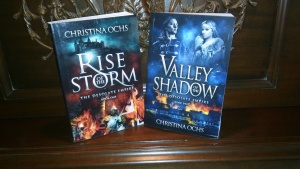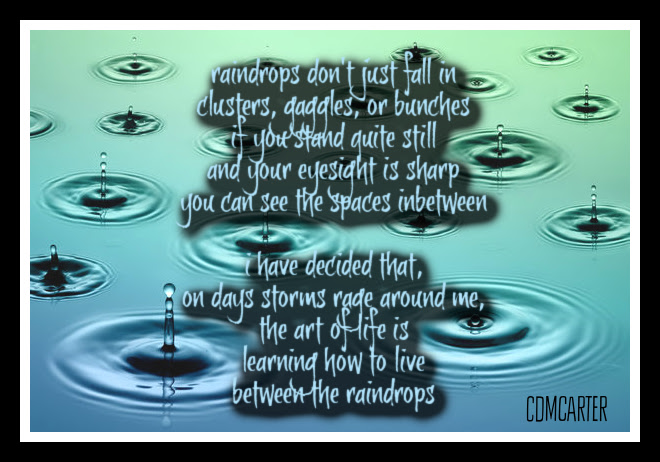Tags
blogging101, Books, Christina Ochs, Creative Writing, The Desolate Empire, The Rolling Writer, Writing 101
THIS is a VERY late assignment #19 for Writing 101: Finding Everyday Inspiration (September 2015). The assignment was to feature a guest on your blog, and I had the perfect person in mind. But it just so happened we’d gone back to Maryland to meet our new granddaughter in the middle of that course and I never got it done.
I planned it to do double duty, also, as a response to a post by Janet Thomas on her blog Elixir: Creative and Reflective Writing. The post was A Sacred Space (October 5, 2015) and asked the question, “Is a private writing space necessary?”
The perfect person I had in mind is Christina Ochs of The Rolling Writer! Christina was the very first blogger I met on opening up shop at Impromptu Promptlings in October 2014. In fact, within a month of bumping into her we were sitting in Village Inn in Woods Cross, Utah having a three-hour brunch while her hubby had a much-needed nap out in their truck. Their BIG truck! As in 18-wheeler! Which just so happens to be where Christina calls home and does her writing.
 When I met Christina she was just getting ready to have the first book in her The Desolate Empire fantasy series (a fictional story based on Europe’s Thirty Years’ War) proofed for publication. I was tickled pink to be asked to be one of her beta readers for Rise of the Storm and subsequently for Valley of the Shadow. Now the war continues with Hammer of the Gods which will go to publication in mid-to-late May. That being the way of things, I figure this is the perfect time to post our little interview!
When I met Christina she was just getting ready to have the first book in her The Desolate Empire fantasy series (a fictional story based on Europe’s Thirty Years’ War) proofed for publication. I was tickled pink to be asked to be one of her beta readers for Rise of the Storm and subsequently for Valley of the Shadow. Now the war continues with Hammer of the Gods which will go to publication in mid-to-late May. That being the way of things, I figure this is the perfect time to post our little interview!
Christina hails from Oregon, but her home is on wheels, which speaks directly to Janet’s question about writing space…
* * * * *
Calen: Janet Thomas has posed a question about the need for writers to have their own private writing space. YOUR writing space is anything BUT private! How does that work for you?
Christina: It works surprisingly well! Probably the biggest drawback is unpredictably difficult conditions like heavy traffic or curvy roads. The other is lack of routine. We pick up and deliver loads at all hours of the day or night and sleep when we can. So all the advice about setting up a routine for writing just doesn’t work for me, or at least very seldom.
My driver husband is very handy, and worked out a way to mount my laptop to the passenger-side dashboard. Because we have two cats, I have to protect the keyboard from them, so that’s covered by a piece of old refrigerator shelf. I use a wireless mouse and keyboard so I don’t have to lean forward. I have internet connection about 90 percent of the time, using a wifi hotspot on my iPhone.
The routine might be irregular, but because I don’t drive I have tons of time. Using it productively is another matter, but over the past two years I’ve greatly increased my writing stamina. The constant travel can be inspiring since the scenery is always changing. It can be distracting too. All in all, I love it and so far am resisting any thoughts of settling down in one place. Fortunately my husband agrees. Whenever we’re done with trucking, we’ll probably get an RV and keep traveling.
Calen: The Thirty Years’ War in Europe was a HUGE subject to tackle. How on earth did you get interested in fictionalizing that story?
Christina: My mother is German, so from childhood on, I spent a lot of time in Germany. The Thirty Years’ War is kind of an equivalent to the Civil War in the U.S.; there are a lot of battle sites and people interested in the history. Re-enactors are very popular. So it was always kind of in the background, though I didn’t really get inspired until I visited Heidelberg Castle at age eighteen. I found the story of its most famous inhabitants-Elector Frederick V and his English wife Elizabeth-very romantic, and for years afterward I thought about writing historical fiction about them. I did more reading about the war they helped start and discovered even more intriguing characters involved- people like King Gustav Adolf of Sweden, Cardinal Richelieu and Bernard of Weimar.
While turning it all into historical fiction sounded interesting, it was also very daunting. This war was long (obviously) and very convoluted. Just understanding the events leading up to it is difficult and there are many boring parts interspersed between only a few truly thrilling moments. So I put it on the back burner for years, until I started reading historical fantasy series like Jacqueline Carey’s Kushiel’s Legacy, Diana Gabaldon’s Outlander, and George R.R. Martin’s Song of Ice and Fire. Those stories and others like them opened my eyes to the possibility of writing the war as a kind of alternate history in which I wouldn’t have to stick to exact events. I could use historical figures as a basis for my own characters, but could also do what I wanted with them. The final piece fell into place when I realized I could incorporate the Protestant Reformation into the whole saga. Since I’m making it all up, it doesn’t matter that I’ve skipped over a whole century.
I also like the idea of being able to create more female characters than if I had stuck strictly to real history. Being a woman myself, I really enjoy female characters who make things happen, who aren’t just sex objects or who sit around doing embroidery and nothing else. The idea of a more significant role for women also helped inspire me to create a society that, while it resembles early modern Europe in many ways, also differs significantly.
Calen: You’re just finishing up Book 3 of The Desolate Empire fantasy series. How many books do you imagine it will take to tell the whole story?
Christina: I’ve planned five books for The Desolate Empire series (though I’ll do more if the story requires it). Rise of the Storm covers the events leading up the first battle of the war. Valley of the Shadow picks up in the aftermath of that battle and covers the subsequent four years of the war. Hammer of the Gods focuses on the first part of a fictionalized “Swedish phase” of the Thirty Years’ War. That phase only lasted a few years in reality, but because it was so interesting, I’m stretching it out longer and will cover it in two books. This means there’s a good possibility I will need six books to tell the whole story.
* * * * *
So there you have a little peek into Christina’s amazing writing world. While Hammer of the Gods is going to beta readers now, she has her imagination full of Book 4, Winter of the Wolf, which she hopes to have out by the end of the year.
Please do take the time to check out Rise of the Storm and Valley of the Shadow at Amazon. The characters are wonderfully relatable, and the books are filled with all kinds of trivia and interesting insights as to how military camps functioned during the wars, which I found particularly interesting. And be sure to stop by The Rolling Writer for all kinds of tidbits and snippets of the books!
Special thanks to Christina for allowing me to be a part of her publishing adventure. It’s been interesting to see the process from beginning to end! And good luck, girlfriend, getting Hammer of the Gods on its way to the publisher in time! 😀

Fascinating interview! I’ve “known” Christina for quite some time now, and have often wondered about the details of her life– writing on the road. Thanks, ladies!
LikeLiked by 1 person
So glad you enjoyed it, Teresa. And thanks for stopping by and commenting.
LikeLike
Pingback: 10 Important Things In My Life… | Impromptu Promptlings
Very interesting. I’m afraid I need a “very special” place to write and admire she can do it on the go.
LikeLiked by 1 person
Well heck, my fishy friend, we all got our own styles. And your sure have plenty of that! 😉 😀
LikeLike
Style…I’m afraid my style is called OuttaStyle.
LikeLiked by 1 person
Oh friend! You just march to your own drummer! Wish I was brave enough to do that! 😀
LikeLike
Oh well I’m so glad to have landed here today! Well done.
LikeLiked by 1 person
Thanks, Jay. Just call me turtle… I’m a little slow. But good timing for Christina! 😀
LikeLike
Thanks for interviewing me! I remember that epic brunch well- pumpkin pancakes!
LikeLiked by 1 person
Yes! I thought of you when I had them at Village Inn last fall. I hope you managed to get to Seattle on time. I felt the wind in my sails as you flew by!!! 😀 {{{Christina}}}
LikeLike
We made it, though not quite on time, since we had to make a weather-related detour. We’re here now, though!
LikeLiked by 1 person
very inspirational! I have no excuses…who would have thought one could write historical fiction as a passenger in an 18 wheeler! She is amazing and by the way, it was a great interview. I love historical fiction so just may have to check out her books. Thanks so much.
LikeLiked by 1 person
I know, pretty amazing, isn’t it? I have trouble writing if anyone is in the house! (And yet I can go to Starbucks and write like crazy. Maybe because I don’t KNOW anyone there and don’t CARE what they think?) What is so interesting about her books is seeing the war from characters on both sides. Characters that you LIKE! You want to rearrange some of them! LOL
LikeLike
Great job with the interview GF!! I can kind of relate. When we went back to Hawaii last Oct I was able to write for almost the whole flight over. Coming back I wasn’t as productive.
LikeLiked by 2 people
Well, when you get “Santa Baby” published we can do one for you!!! 😀
LikeLike
Very good interview, and I’m thinking, you should do this on a regular basis. 🙂
LikeLiked by 1 person
Hm… I only know one other person in danger of publishing anything! LOL
LikeLike
Writing on the road – a good way to fill in the time – as long as you’re not the driver. Godd questions and interesting responses…
LikeLiked by 2 people